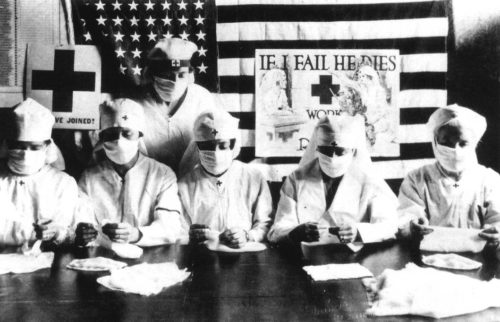
Conversations world wide are focused on the new coronovirus and the pervasive flu season. Headlines and news reports keep a running tally of who is sick and where. We are rightly concerned. But we need to keep this in perspective, study what can be improved in societal responses and take the opportunity to have some important conversations with our elders. I wrote about this a couple years ago in regard to the regular flu season but the topic bears revisiting. We have much to learn from the past and from our ancestors’ reactions to the sweeping illnesses that have always plagued humans.
It’s important to study how we’ve handled past flu epidemics, outbreaks of polio, measles and smallpox. How have we dealt with restrictions and helped each other as decent human beings; individually, and as families and communities?
The word “pandemic” has such an inescapable connotation and creates fear. However, another word that repeatedly comes out of historic references and family letters is this:
Indomitable
It is used to describe how ordinary, sometimes fearful human beings, reach down deep and by the grace of God find the courage and resilience to not only face world changing events but to help those in direst need.
The Centers for Disease Control (CDC) created a project called the Pandemic Influenza Storybook to document experience and provide a learning tool.
“The CDC’s Pandemic Flu Storybook provides readers with a look at the impact pandemic flu events have had on both survivors and the families and friends of non-survivors. These stories are not folklore, but personal recollections. This collection of stories was first released in 2008 to commemorate the 90th anniversary of the 1918 flu pandemic.”
You can read Sadie’s true story here: https://www.cdc.gov/publications/panflu/stories/cure_janis.html
This is the story of the 1918 flu pandemic as told by my 97–year–old grandmother, Sadie Afraid of His Horses–Janis. An excerpt from the story:
In her desperation, my great–grandmother, Nancy, had applied the principals of quarantine, prevented cross–contamination, provided hydration and inhalation therapy, and used pharmacology to save her family. To this day, my grandmother Sadie has a medicine bag with flat cedar, sweet grass, bitter–root, and green tea. However, she says she′ll pass on the kerosene and sugar.
Olivia Huggins father was a newborn when the flu hit his family:
My dad, Manual Pacheco, was born on July 10, 1918 to Juan de Jesus and Amelia Pacheco in Rainsville, New Mexico. He was their sixth child. When Manual was only 2 months old, his mother, Amelia became ill with the flu. Because she was so sick, she was unable to produce breast milk for Manual. Therefore, Juan fed the baby coffee with sugar added to it until he was able to purchase a goat. The goat’s milk sustained Manual and he survived, and so did his mother. No one else in the family became ill.
I can’t help but wonder if Juan had a terrible time getting that little boy to sleep after dosing him with coffee. However, it was a resourceful solution till the goat showed up.
Here’s another one from the CDC’s website, this one taking place in Wyoming and told by Margarita Pancake:
My father, Elmer “Bud” Pancake, grew up around Lusk, Wyoming. During the great flu pandemic of 1918, there was a county doctor who boasted that he had never lost a patient. His secret weapon was “rotgut” whiskey. He would pour the whiskey into a patient to get them to cough up the phlegm. During the pandemic, he ran out of whiskey and there was none to be had in the community. The only whiskey in Lusk was locked–up in the sheriff′s office as evidence for a bootlegger′s trial. The sheriff refused to release the liquor. So, the doctor got a few prominent citizens together for a kind of vigilante committee that promptly seized the whiskey, depriving the sheriff of his evidence.
An excerpt from storyteller Jack D. Bell, who experienced the flu in Washington in 1958 as a kid:
And, I simply was too uncomfortable to sleep! At one point, I kept asking my poor momma if I was going to die and I told her if this kept up much longer that I didn’t care if I died! I can remember my parents discussing whether they should send me to the hospital, but our family doctor (who actually came to our house; remember when doctors did that?!) told us that my fever would break any time, and I would feel much better. He was right, on the third day I stopped vomiting and got a few hours of sleep. When I woke up, my wonderful mom fed me some chicken soup—my favorite, and I kept it down. I missed about a week of school, which I didn’t mind.
Although medical treatments have changed and progressed, much of the simple homing nursing care remains the same and goes a long ways towards helping folks recover. Many of us have experienced the flu running through the entire household and it can truly be said to be a family bonding experience. I bet you still talk about it and I bet your family learned some important coping skills during the process.
Bottom line, wash your hands, take precautions, learn from history and be resilient and courageous. Threats we will always have with us. What you do in the face of it will show your stripes. I choose courage and an indomitable spirit.
Many of us have parents, grandparents or friends who can remember flu, measles or polio scares. Talk to them about how it impacted their lives, schools, and communities. Learn from their resilience, their resourcefulness and step up to the plate if you’re needed.
May you stay healthy and well this flu season and most of all may you be of good courage no matter what you face,
Karen